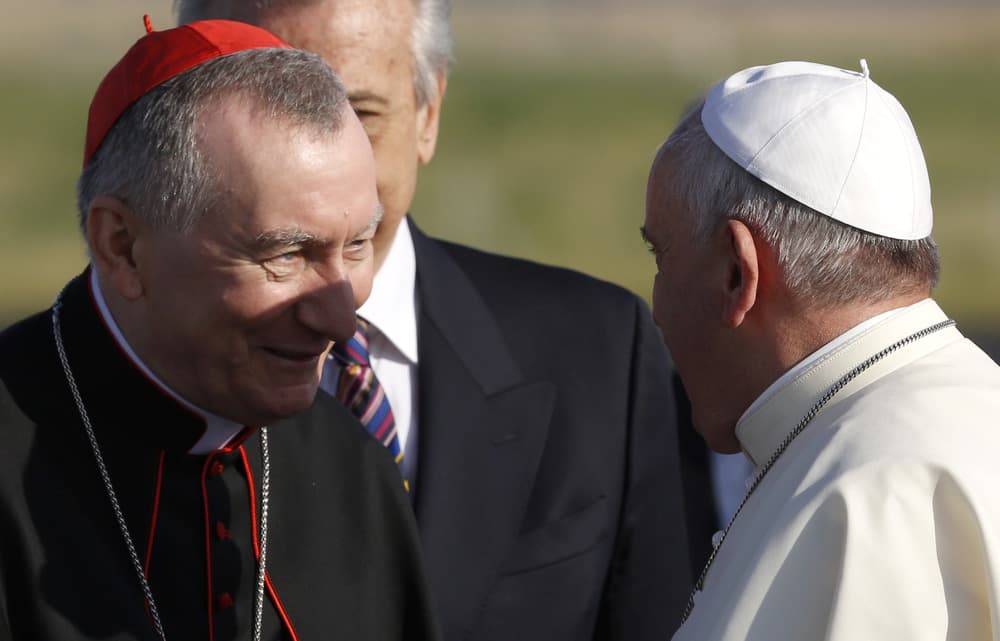ROME – In an interview with Italian media, Vatican Secretary of State Italian Cardinal Pietro Parolin defended Pope Francis’s recent controversial remarks suggesting that Ukraine step back and open to negotiations in its ongoing war with Russia.
Speaking to Italian journalist Gian Guido Vecchi in an interview published in Italian newspaper Corriere della Sera, Italy’s paper of record, Parolin said the pope’s appeal for Ukraine is that “conditions be created for a diplomatic solution in the pursuit of a just and lasting peace.”
“It is obvious that responsibility for the creation of such conditions does not fall solely on one of the parties but on both, and the first condition seems to me to be precisely putting an end to the aggression,” Parolin said when asked whether it was counterproductive to focus solely on the aggrieved party.
He stressed the importance of putting the pope’s response into context, noting that the pontiff was answering a question posed to him, and in his response, the pope “spoke of negotiation and, in particular, the courage to negotiate, which is never a surrender.”
Parolin said the Holy See continues to call for a ceasefire in Ukraine, insisting that “it should be the aggressors who cease fire first – and then the opening of negotiations,” which he reiterated are “not surrender, but courage.”
“We must have greater consideration for human life, for the hundreds of thousands of human lives that have been sacrificed in this war in the heart of Europe,” he said, saying this applies not only to Ukraine, but also to the ongoing war in Gaza and to many other conflicts around the world.
Parolin’s remarks come after portions of a new papal interview were published Saturday on Swiss broadcaster RSI. The interview was recorded Feb. 2, and is expected to be broadcast in full on March 20 as part of a new cultural program.
During the interview, Pope Francis drew immediate criticism with his response to a question about the debate between those who say Ukraine ought to raise a “white flag” and surrender as it has not been able to overcome Russia forces, and those who argue that doing so would legitimize Russia’s actions.
Francis in his answer said he believes “the strongest one is the one who looks at the situation, thinks about the people and has the courage of the white flag, and negotiates.”
“The word negotiate is a courageous word. When you see that you are defeated, that things are not going well, you have to have the courage to negotiate,” he said, noting that many countries, including Turkey, have voiced a willingness to mediate.
Marking the first time he had used the term “white flag” or “defeated” in reference to the Ukraine war, the pope’s remarks were met with fierce backlash from Ukrainian authorities, including President Volodymyr Zelenskyy and Foreign Minister Dmytro Kuleba, as well as several of Ukraine’s allies.
Church leaders in Ukraine also hit back against the remarks, with the Permanent Synod of the Ukrainian Greek Catholic Church issuing a statement saying Ukraine was “wounded yet unbroken, tired yet resilient” and that “Ukrainians cannot surrender because surrender means death.”
Vatican spokesman Matteo Bruni attempted to quell reaction in a statement Saturday in which he said the term “white flag” had been used by the interviewer, and that Pope Francis had simply repeated it “to indicate a cessation of hostilities and a truce reached with the courage of negotiations.”
“His hope is a diplomatic solution for a just and lasting peace,” Bruni said.
In his interview with Corriere della Sera, Parolin said he believes a diplomatic solution to the Ukraine war is still possible, because “these are decisions that depend on human will.”
“The war unleashed against Ukraine is not the result of an uncontrollable natural disaster but solely of human freedom. The same human free will that caused this tragedy also has the possibility and the responsibility to take steps to end it, and pave the way for a diplomatic solution,” he said.
He voiced concern that the Ukraine war, in which several western countries are involved through the provision of military support, could escalate further, saying “The escalation of the conflict, the outbreak of new armed clashes, and the arms race are dramatic and disturbing signs in this regard.”
A broadening of the war means more suffering and death, with civilians, especially women, children and the elderly, “paying the all-too-high price of this unjust war,” he said.
Parolin also said concerns about a “fatal drift towards nuclear war” are real, noting that “certain government representatives resort to this sort of threat” frequently.
“I can only hope that this is strategic propaganda rather than a ‘warning’ of something truly possible,” he said, saying the Holy See’s fear is that “the various actors in this tragic situation may become even more entrenched in their own interests, not doing what they can to achieve a just and stable peace.”
Asked about the similarities between the Ukraine war and the ongoing war in Gaza, Parolin said they have both “dangerously widened beyond any acceptable limit,” and are having not just regional, but global repercussions.
Neither conflict can be resolved “without serious negotiation,” Parolin said, saying, “I am concerned about the hatred they are generating. When will wounds this deep ever be healed?”
Follow Elise Ann Allen on X: @eliseannallen












